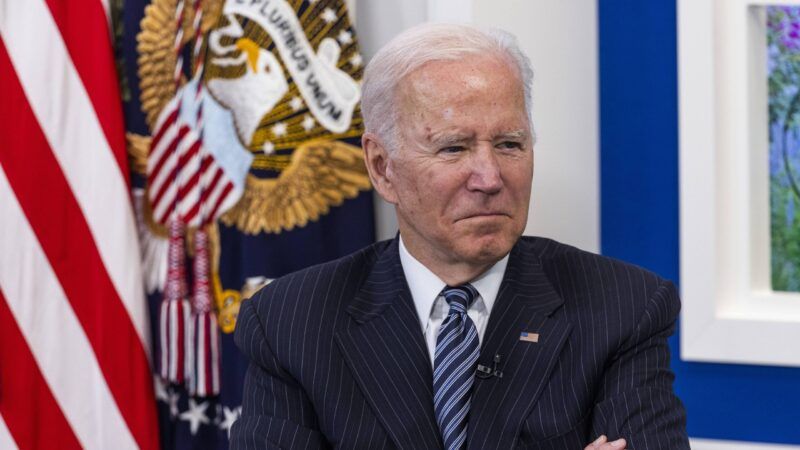Democrats' Proposed 'Billionaire Tax' Is Definitely a Wealth Tax, and It May Be Unconstitutional
Imposing a wealth tax may not even be among the enumerated powers of Congress.

President Joe Biden got himself elected partly by opposing the billionaires' wealth tax proposed during the primary campaign by Sens. Elizabeth Warren (D–Mass.) and Bernie Sanders (I–Vt.). Now, in a reversal, Biden is preparing to embrace the idea.
It wouldn't be the first time that a presidential candidate's plans changed after getting elected. The shamelessness of the way that Biden has shifted on the issue, though, is something else. It risks undercutting Biden's claim to being a voice of moderation. It also may reinforce voter cynicism. How's democracy supposed to work if a politician, once elected, brazenly abandons one of the policy positions that won him the job?
Biden told wealthy donors during the campaign that they shouldn't expect a tax cut from him. "But! No punishment, either," he said.
That promise may not survive the Senate, which is readying what The New York Times describes as "a proposal by Senator Ron Wyden, an Oregon Democrat and the Finance Committee chairman, that would raise hundreds of billions of dollars with a wealth tax on just 600 to 700 people — America's billionaires." The Times reports that "under the proposal, people with $1 billion in assets or $100 million in income for three consecutive years would be brought into a new tax system. Initially, they would have to assess the current value of their tradable assets — like cash, stocks and bonds — and their value when they were purchased, then pay a one-time tax on them."
The Washington Post reports that "The plan would also set up a system for taxing assets that are not easily tradable, such as real estate," and that "billionaires would also be able to take deductions for any annual loss in value of those assets."
The constitutional challenges that such a plan would face are considerable.
The number of persons subject to such a tax is small enough that it could be subject to the Constitution's prohibition, in Article I, against a bill of attainder.
The 16th Amendment that gave Congress the power to tax income applies to income taxes, not wealth taxes. Imposing a wealth tax, then, may not even be among the enumerated powers of Congress. Hence the effort by Secretary of Treasury Janet Yellen to deny that the Biden-Wyden Wealth Tax even is a wealth tax. "I wouldn't call that a wealth tax," she said Sunday on CNN. Her colleagues among the congressional Democrats are more plainspoken. "We will probably have a wealth tax," House Speaker Nancy Pelosi (D–Calif.) said.
A wealth tax could also violate the Fifth Amendment takings clause, the 14th Amendment's due process and equal protection clauses, and the Article I prohibition against ex post facto law. I understand that courts have ruled the ex post facto provision applies to criminal law, not tax rates. But the philosophical and moral point that laws should be predictable and prospective rather than arbitrary and retroactive applies. People took risks and structured businesses based on an understanding of tax law as it was. For non-billionaires, imagine how you'd feel if something the government had told you was tax-exempt—say, your past charitable contributions or mortgage interest, or accumulated gains in your retirement account—was suddenly going to be subject to taxes. It'd be like changing the rules of a baseball game not just mid-season, but mid-plate-appearance.
It's possible that Biden himself is secretly hoping that some future court strikes the billionaires tax down as unconstitutional. Unlike Warren and Sanders, Biden didn't really want to punish successful entrepreneurs. He does, though, want to push his spending plans through Congress, and if this is the only way to do that, it appears to be a price he would accept. If a court eventually blocks the tax, Biden would get what'd be for him politically the best of both worlds—the spending, but not the tax increase.
It reminds me a bit of when former President George W. Bush signed the McCain-Feingold Bipartisan Campaign Reform Act of 2002 into law. Substantial portions of it were later struck down by the Supreme Court as unconstitutional. Bush had signed the bill into law while saying, "Certain provisions present serious constitutional concerns….I also have reservations about the constitutionality of the broad ban on issue advertising."
The Constitution includes the wording of a presidential oath of office that says the president "will to the best of my ability, preserve, protect and defend the Constitution of the United States." A veto of the billionaires tax would let Biden keep his "no punishment" campaign promise—and would also honor his inauguration day oath.


Show Comments (321)